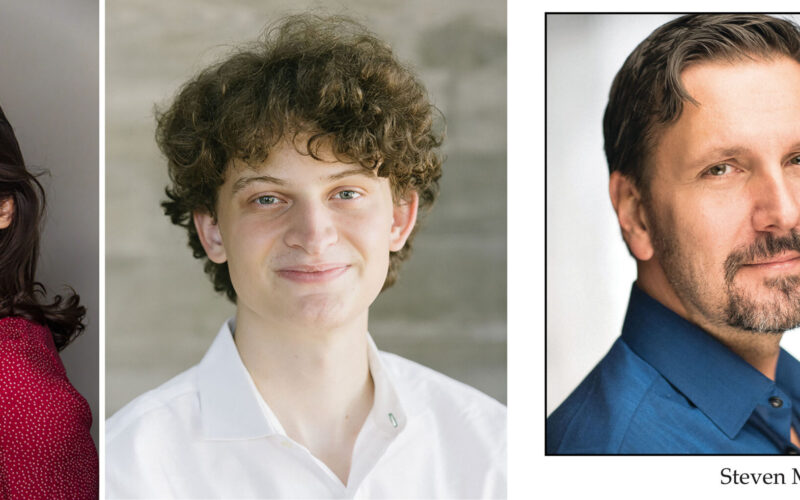BECCA MARTIN-BROWN
bmartin@nwaonline.com
Perhaps any production of Jen Silverman’s “Witch” should come with a warning. Ashley Lee, writing in the Los Angeles Times in September 2019, muses that art seemed to reflect life at the Geffen Playhouse.
In the dark comedy, based on a Jacobean play from 1621, the devil comes to Edmonton to snatch up some souls. Elizabeth seems like an easy catch; she’s already an outcast, labeled a witch by the townspeople. Other characters — “the king’s shunned son and the farmer who eyes the throne,” as Lee describes them — can’t resist. But Elizabeth refuses to take the bait.
“Yes, but you see the thing is nobody says ‘No,’” the devil says, flummoxed.
“What he doesn’t initially understand is that women are quite used to dulling our desires and quieting our existences,” Lee writes. “We’re told from a young age not to be too loud, too difficult, too emotional. And we sure as hell can’t lose our temper.”
So when women in the audience enjoyed that performance too much, laughing and sighing in unison, an older man shushed them.
“Relax,” he said smugly. “It’s just a play, folks.”
Clearly, there’s more to this comedy than a chance to laugh.
University Theatre at the University of Arkansas in Fayetteville presents “Witch” under the direction of Steven Marzolf Feb. 23-March 3. Marzolf, head of undergraduate performance at the UA, calls it an “important piece of theater” new to Northwest Arkansas.
“I was encouraged by my colleague, Morgan Hicks, to read this play to be in consideration for this season,” he explains. “I immediately was struck by how moved I was by the piece. … ‘The Witch of Edmonton’ was a morality tale with slapstick humor and was quite dense. This re-work, done by the wonderful Jen Silverman, is funny, poignant and of our time.
“What I find interesting is how we as a society can easily label someone and that then becomes ‘who they are.’ The play is commenting on this through the guise of calling someone a ‘Witch.’
“The play touches on gender issues, sexuality, classism, among others,” Marzolf adds. “But a big question the play asks is: How much is your soul worth when hope is hard to come by. I would like for audiences to ask themselves that question upon leaving the theater. It’s a big and deep question, but it’s an important question, especially given the times we live in.
“The relevancy of the piece and how I responded when I read it is the big reason why I wanted to direct it.”
Marjorie Gast, a first-year MFA acting student from Cedar Falls, Iowa, plays Elizabeth.
“There is something very special about this script,” she says. “I think it is really exciting to be a part of a show that the more you dig into, the more answers you need to excavate. That’s what I believe theater should do — propel you to continually ask questions and grow.”
Elizabeth, she says, “is an extremely smart, funny, perceptive and self-sufficient woman … with a witty sense of humor and a deep understanding of what it is to be ostracized.”
But “this idea of ‘labeling’ goes much farther than just Elizabeth in this particular show,” Gast says. “Specifically, what is the one misstep that labels one as a ‘witch’ or an ‘outsider’ and how do these characters live in response to these labels? From this, we see the parallel of stereotypes of any kind translate to the world outside of the play, not just the word ‘witch.’”
“I hope that audiences question the way they are treated by others and the way they treat others,” says Alex Ahuja of Fayetteville, who plays Scratch, aka the Devil. “I want them to be able to discover the problems they may have never noticed in their life, and I want them to take the first few steps towards change.
“There is so much ignorance and hate in this world, and it can be easy to not notice any of it. I hope that this play allows the audience to truly open up their hearts and their minds to the problems of the world and help all of those around them that are struggling because of the way the world might treat them.”
__
FAQ
‘Witch’
WHEN — 7:30 p.m. Feb. 23-24; 2 p.m. Feb. 25; 7:30 p.m. Feb. 28-March 2; 2 p.m. March 3
WHERE — University Theatre at the Global Campus Theatre on the Fayetteville square
COST — Free, but reservations required
INFO — hogsync.uark.edu
FYI — This performance is intended for audiences 13 and older, and contains strong adult language and stage violence.










